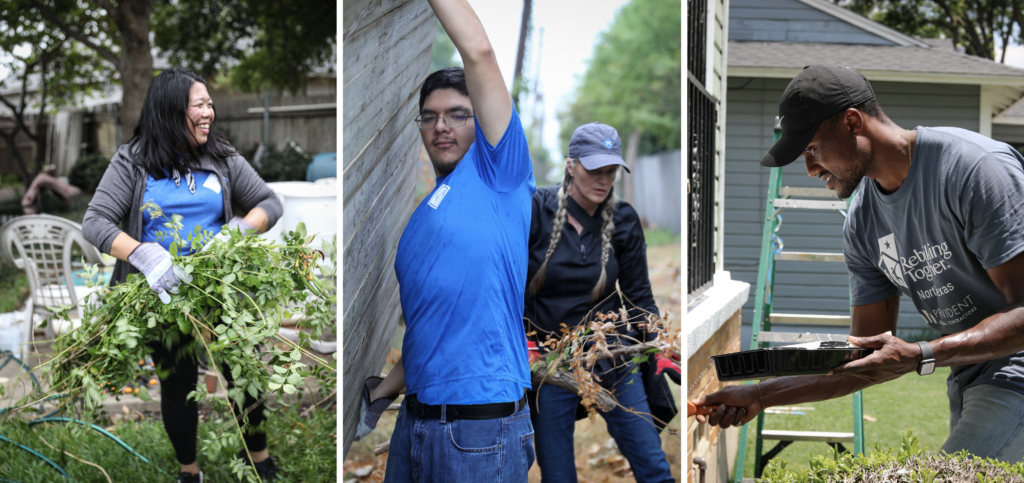
Rebuilding Together North Texas is dedicated to repairing homes, revitalizing communities, and rebuilding lives. By providing essential home repairs for low-income homeowners in the Dallas-Fort Worth Metroplex—especially for seniors, veterans, and disabled individuals—the organization ensures homes are safe, functional, and sustainable, preserving both the homes and the quality of life for those who live in them.
For Tia LaFavor, this mission is close to her heart. She has been part of Rebuilding Together North Texas (RTNTX) for 11 years, starting as a volunteer in 2013. Her passion for community revitalization and engagement led her to serve on the Board of Directors, then take on the role of Director of Operations, and become the Executive Director of RTNTX in late 2022.
Recently, RTNTX teamed up with Fannie Mae and Common Impact on a skills-based volunteering project to enhance their financial forecasting and grant management processes. This collaboration is another step forward in supporting Tia and her team.
Volunteers are essential to our operations, handling everything from client service and intake to program support and project coordination, all while ensuring we meet the needs of our community.
How does Rebuilding Together North Texas address the broader issues of housing inequality and community revitalization in North Texas?
We serve low-income seniors, people with disabilities, veterans, surviving spouses of veterans, first responders, teachers, nurses, and families with children in the home.
There’s a significant shortage of affordable housing in the Dallas–Fort Worth area. Texas Housers published a report in March highlighting this issue, particularly for renters. While we don’t work on rental homes—only owner-occupied homes—the report is still relevant to our efforts to preserve affordable housing. The national average of affordable and available housing units is 34 for every 100 extremely low-income households, and in Texas, it’s 25 for every 100, while in Dallas, it’s 17 for every 100. Dallas falls well below both the national and state averages. The existing affordable housing is often aging and in disrepair, leading to unsafe living conditions.
Many homes in low-income communities lack proper insulation and ventilation and require critical repairs, contributing to the continuous cycle of poverty and health issues. We address these problems by providing essential repairs and upgrades to ensure homes are safe, healthy, and energy-efficient. These improvements support better living conditions, reduce long-term costs for homeowners, and enhance residents’ overall health and well-being.
The communities we serve are also affected by environmental and health challenges, such as the heat island effect, food deserts, transportation deserts, and job deserts. Our efforts to improve housing quality align with broader community revitalization strategies. By addressing housing, we’re helping stabilize communities and making them more resilient to environmental and economic challenges.
Can you share a recent success story that highlights the impact of Rebuilding Together North Texas?
One of our most impactful projects was at Anna’s home, which we worked on during the first half of this year. Anna faces mobility challenges, is in her seventies, and is retired. When I first visited her home for a site visit after she applied for assistance, it was immediately apparent that she was living in highly unsafe and unhealthy conditions.
The unstable foundation, damaged flooring throughout the home, and inaccessible bathrooms needed attention. She had no central air, and her few window units were inadequate for the Texas heat. The kitchen was barely functional, and the doors and windows were in a state of disrepair.
Anna successfully managed the foundation and bathroom repairs, but the rest of the home still needed significant attention. We helped replace all the flooring throughout her home, installed ceiling fans to improve air circulation, and replaced all the doors and windows to enhance security and energy efficiency. We completely renovated her kitchen with new countertops, cabinets, a sink, and appliances, making it more functional and welcoming.
We also installed a new A/C system to ensure her home’s comfort during the hot summer months. Additionally, we carried out electrical and plumbing repairs, replaced damaged and moldy ceilings and drywall, and replaced her roof, which had several major leaks causing extensive damage inside her home.
What was once a hazardous and unhealthy environment is now a safe, comfortable, and dignified living space where Anna can enjoy her retirement and look after her young grandkids, who visit often. This project exemplifies RTNTX’s mission: to preserve affordable homeownership and revitalize communities by ensuring everyone has a safe and healthy home.

What is your long-term vision for Rebuilding Together North Texas, and how does the organization plan to achieve it?
My long-term vision for RTNTX is to continue providing deep, impactful repairs that truly transform the lives of homeowners like Anna. While doing so, we aim to significantly increase our capacity to serve more families across the region. We cover a vast area, including Dallas, Collin, Rockwall, Tarrant, and Denton, with immense demand for our services. We have an extensive waitlist of over 200 families and had to close our applications in February 2023 due to high demand.
We’ve been working hard to grow our organization by expanding our team and resources and improving our processes so we can take on more projects without compromising quality. Building strong partnerships with local businesses and organizations is a big part of our success. These relationships have been key in helping us secure the resources and expertise needed to handle the complex repairs many of our clients require, and we’re excited to keep growing these connections. Volunteers are the heart of what we do, so we’ve adjusted our programs to match their interests better while ensuring their contributions have the greatest impact. This flexibility has allowed us to keep volunteers engaged in meaningful ways and continue scaling our efforts to help more communities.
What role do volunteers play in Rebuilding Together North Texas’s success, and what role does skills-based volunteering play?
With just three employees covering five counties, we rely heavily on volunteers to help us accomplish our mission. Our volunteers come from all walks of life and contribute in many ways. Some help with landscaping and demolition, while contractors provide pro bono work and specialized services. Volunteers are essential to our operations, handling everything from client service and intake to program support and project coordination, all while ensuring we meet the needs of our community.
We need volunteers’ professional expertise to operate efficiently and support our small staff. Skills-based volunteers play a crucial role, fill gaps that would otherwise require costly additional staff, and allow us to stretch our budget further and focus more on helping homeowners. Their contributions are invaluable and keep us running. We truly couldn’t do it without them.
Rebuilding Together North Texas recently collaborated with Fannie Mae through a skills-based volunteering program focused on developing a financial forecasting and probability matrix. What impact do you expect this skills-based volunteering project will have on RTNTX?
This project focused on developing financial forecasting tools and a matrix to enhance our grant management process. The tool provides a clearer, more accurate picture of our economic landscape, which allows us to make better-informed decisions. It improves our ability to forecast financial needs and opportunities, predict which grant applications might succeed, and allocate our time and resources more effectively.
Thanks to the support from the Fannie Mae team, our Treasurer and Director of Grants and Outreach now have the tools they need to stay organized and keep our grant process aligned with our financial planning. We’re already seeing positive changes in how we manage grants and finances.






